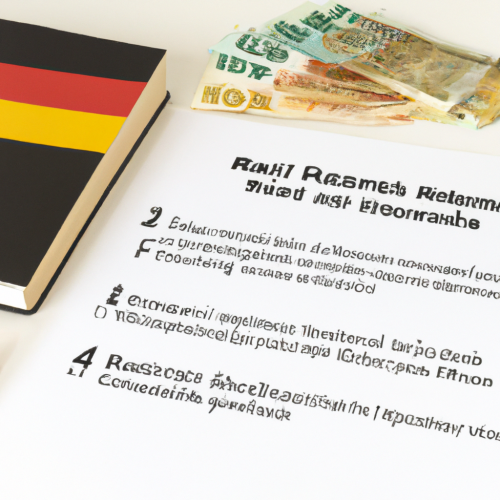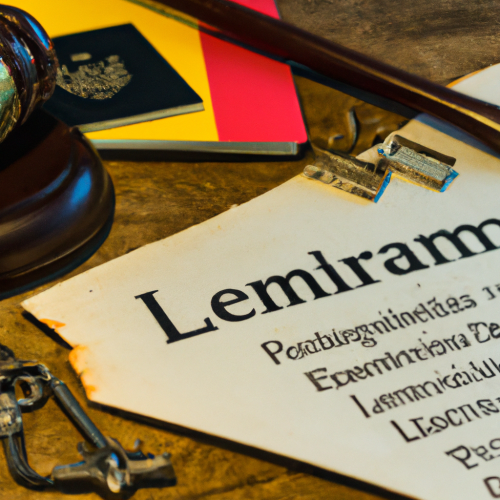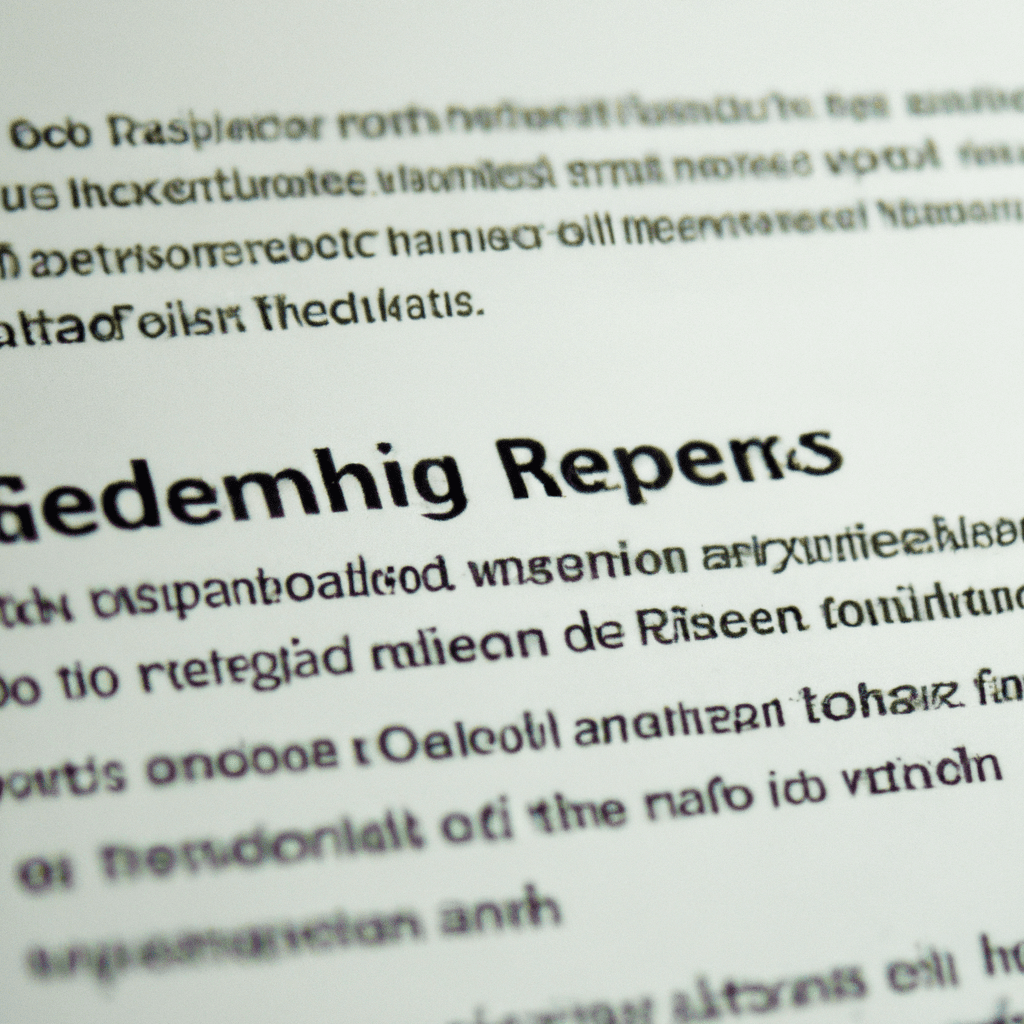Germany is known for its rich history, vibrant culture, and thriving job market, making it an attractive destination for many individuals seeking to establish residency in the country. However, navigating the process of obtaining German residency can be a complex and overwhelming journey without proper guidance. From understanding the various types of visas to meeting the necessary requirements, it is essential to have a comprehensive guide to help you through each step of the process. In this article, we will provide you with all the information you need to know to successfully obtain German residency, ensuring that you are well-prepared and informed throughout your journey. Whether you are planning to study, work, or settle down in this magnificent country, this guide will assist you in understanding the steps and requirements involved, enabling you to make an informed decision and embark on your German residency journey with confidence.
Steps and Requirements for Obtaining German Residency
Obtaining German residency can provide exciting opportunities for individuals looking to live, work, or study in this vibrant European country. To help you navigate through the process, we have outlined the essential steps and requirements to make your journey smoother.
Step 1: Research and Understanding
Your first step is to familiarize yourself with the various types of residency permits available in Germany. Whether you plan to work, study, reunite with family, or start a business, each category has specific criteria and requirements. Conduct thorough research and determine which permit aligns with your circumstances and goals.
Once you have chosen the appropriate permit, gather information on the application process, required documents, and any language proficiency exams or certifications you may need to complete. Additionally, gaining knowledge about German culture, customs, and legal requirements will prove valuable throughout your residency journey.
Step 2: Document Preparation and Application Submission
After understanding the requirements for your chosen permit, it is time to gather the necessary documents. These typically include a valid passport, proof of health insurance, proof of financial stability, and a completed application form. Some permits may require additional documents like employment contracts, university acceptance letters, or marriage certificates.
Once you have compiled all the required documents, submit your application to the local German embassy or consulate in your home country. Ensure that your application is complete, accurate, and meets all the specified criteria to increase your chances of a successful outcome. Be prepared for potential interviews or additional requests for information during the processing stage.
Step 3: Residence Registration and Integration
Upon arriving in Germany, it is mandatory to register your residency within a certain period. Visit the local Resident Registration Office (Einwohnermeldeamt) with your passport, permit documentation, and evidence of your address in Germany. The office will issue you a Residence Registration Certificate (Anmeldung), which is an important document for various administrative processes.
To integrate successfully into German society, consider attending language courses to enhance your communication skills and improve job prospects. Connecting with local communities and joining cultural or social organizations can also help immerse yourself in the German way of life, fostering friendships and support networks.
Becoming a resident of Germany opens doors to a wealth of opportunities and experiences. By following these steps and meeting the relevant requirements, you’ll be well on your way to obtaining German residency and embarking on a fulfilling new chapter of your life.

Legal Framework for Residency in Germany
Germany offers various pathways for individuals seeking residency within its borders. Understanding the legal framework is essential to navigate the process efficiently. Here are some key aspects to consider:
- Visa Types: Germany offers several visa categories, each catering to different purposes of stay, including study, work, family reunification, or asylum. Applicants are required to obtain the relevant visa before entering the country.
- Residence Permits: Once in Germany, individuals must obtain a residence permit within the validity period of their visa. Depending on the purpose of stay, there are different types of residence permits available, such as student residence permits, employment residence permits, or settlement permits for permanent residency.
- Entry Requirements: To qualify for a residence permit in Germany, applicants generally need to meet specific conditions, which vary depending on the visa type. These may include holding valid health insurance, financial means to support oneself, or having a registered address.
- Integration Courses: For individuals seeking to become permanent residents in Germany, participation in mandatory integration courses may be required. These courses help newcomers learn the German language, cultural aspects, and important societal values.
It is important to note that German residency laws are subject to change, and it is advisable to consult the official website of the German Federal Foreign Office or contact the nearest German embassy or consulate for the most up-to-date information and guidance regarding individual circumstances.

Types of Residence Permits Available in Germany
Germany offers several types of residence permits to individuals who wish to live and work in the country. These permits are issued based on different circumstances and purposes, allowing foreigners to stay in Germany legally and enjoy the various opportunities the country has to offer.
1. Student Residence Permit: This permit is for individuals who plan to study at a recognized German educational institution. It allows students to reside in Germany during the duration of their studies and may also grant the opportunity to work part-time.
2. Job Seeker Residence Permit: Designed for individuals actively seeking employment in Germany, this permit allows non-EU citizens to stay in the country while searching for job opportunities. It is valid for a certain period, usually up to six months, during which the individual can explore the German job market.
3. Blue Card Residence Permit: This residence permit is specifically for highly skilled individuals from non-EU countries. It is granted to those who have a job offer in Germany that meets specific criteria, such as qualifications and salary requirements. The Blue Card allows professionals to work and reside in the country with certain advantages, such as easier access to permanent residence.
4. Family Reunion Residence Permit: Foreign nationals who have immediate family members residing in Germany may apply for a family reunion residence permit. This permit enables individuals to join their family members and live with them in Germany for a specific period of time.
These are just a few examples of the residence permits available in Germany. Each permit has its own requirements and application process, so it is essential to gain a clear understanding of the specific permit that suits your situation before starting the application process.
Documents Required for Residency Application in Germany
When applying for residency in Germany, it is crucial to ensure that you have all the necessary documents ready to facilitate a smooth application process. The following list outlines the documents typically required:
- Valid Passport: You will need your passport to prove your identity and citizenship. Ensure that your passport is valid for the duration of your intended stay in Germany.
- Proof of Health Insurance: Germany mandates health insurance coverage, so it is important to present proof of your valid health insurance policy or secure health insurance before the application.
- Completed Application Form: Fill out the official application form accurately and ensure that all relevant sections are completed diligently.
- Proof of Financial Resources: Demonstrate that you have sufficient financial means to support yourself during your time in Germany by providing bank statements or letters of sponsorship.
- Biometric Passport Photos: Furnish recent biometric passport-size photographs that meet the specifications outlined by German authorities.
- Proof of Accommodation: Show evidence of your intended place of residence in Germany, be it a rental agreement, accommodation letter, or confirmation from a hotel or guesthouse.
- Educational Documents: Depending on your circumstances, provide relevant educational documents such as diplomas, academic transcripts, or other qualifications.
- Police Clearance Certificate: Obtain a police clearance certificate from your home country or any other country where you may have lived for more than six months in the past five years.
Keep in mind that the specific requirements for residency applications may vary depending on factors like the purpose of your stay and your country of origin. It is recommended to thoroughly research and consult the local German embassy or consulate in your home country for further guidance on the required documents for your particular situation.
Having all the necessary documents ready will greatly contribute to a successful residency application, ensuring you can embrace your new chapter in Germany with ease.
Process of Applying for German Residency
The can be complex, but with careful preparation and attention to detail, it is achievable. Here is a step-by-step guide to help you navigate through the application process:
1. Gather Necessary Documents
- Valid passport or national identity card
- Proof of health insurance coverage
- Completed residency application form
- Evidence of financial means to support yourself in Germany
- Recent biometric passport photographs
2. Make an Appointment at the Local Foreigners’ Office
Once you have collected all the required documents, it’s time to schedule an appointment at your local Foreigners’ Office or “Ausländerbehörde.” During this appointment, you will submit your application and have the opportunity to ask any questions you may have.
3. Attend the Biometric Data Collection Appointment
After submitting your application, you will be given a date for your biometric data collection appointment. This appointment involves having your fingerprints and a digital photograph taken. It is important to arrive on time and bring all necessary documents, as failure to do so may result in delays in processing your application.
4. Wait for Decision and Residence Permit Issuance
Once your application has been submitted and biometric data collected, you will need to wait for the decision on your residency permit. This process can take several weeks or even months, depending on the workload of the authorities. If your application is approved, you will receive your residence permit, allowing you to legally reside in Germany.
Tips for a Successful Residency Application in Germany
When applying for a residency in Germany, it’s crucial to present a strong application that highlights your qualifications and convinces the selection committee. Here are some valuable tips to help you stand out from the competition:
1. Thoroughly Research the Residency Program
Before applying, make sure you have a clear understanding of the residency program you are interested in. Consider the program’s requirements, goals, and expectations. Tailor your application to demonstrate how your skills and aspirations align with their specific focus. Take the time to familiarize yourself with the program’s faculty, facilities, and past projects – this will allow you to showcase your genuine interest and commitment.
2. Craft a Well-Structured Personal Statement
Your personal statement should be concise, impactful, and tailored to address why you are an ideal candidate for the residency program. Highlight your relevant experiences, achievements, and artistic vision. Be sure to emphasize how this opportunity in Germany will contribute to your artistic growth and the unique perspective you can bring. Use bold statements to emphasize key points and engage the reader.
3. Curate an Impressive Portfolio
Your portfolio is your chance to showcase your talent and creativity. Select your best works that align with the program’s focus and present them in a visually appealing way. Clearly label each piece with the medium, dimensions, and any other relevant information. Include a diverse range of your artwork to demonstrate your versatility. Additionally, consider adding a short description or artist statement for each piece, providing insights into your process and conceptual considerations.
By following these tips, you will be on your way to a successful residency application in Germany. Remember to pay attention to deadlines, proofread your documents, and reach out for guidance when needed. Good luck!
Key Takeaways
In conclusion, obtaining residency in Germany may seem like a complex process, but with the right information and guidance, it can be managed smoothly. This guide has provided you with a step-by-step walkthrough of the necessary requirements and procedures to follow. It is crucial to ensure you gather all the required documents, fulfill the necessary criteria, and submit your application accurately. Additionally, seeking assistance from authorities, embassies, or immigration lawyers can be beneficial to ensure you are well prepared and informed throughout the process. Remember, patience and persistence are key when navigating the German residency journey. By following this guide and putting in the necessary effort, you are on your way to securing your place in this vibrant and culturally rich country. Best of luck in your pursuit of German residency and a new chapter of your life in this beautiful nation.





